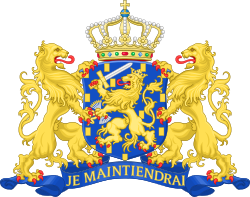| Dutch: Ministerie van Algemene Zaken | |
 Logo of the Ministry of General Affairs | |
 Building of the Ministry of General Affairs | |
| Department overview | |
|---|---|
| Formed | 3 July 1937 |
| Jurisdiction | Kingdom of the Netherlands |
| Headquarters | Binnenhof 19, The Hague, Netherlands |
| Employees | 400 |
| Annual budget | €1.4 million (2018) [1] |
| Minister responsible | |
| Department executive |
|
| Website | Ministry of General Affairs |
The Ministry of General Affairs (Dutch : Ministerie van Algemene Zaken; AZ) is the Dutch Ministry responsible for government policy, planning, information, and the Dutch royal house. The Ministry was created in 1937 and dissolved in 1945, but in 1947 it was reinstated by Prime Minister Louis Beel. The Ministry remained small until 1967, when it was greatly expanded by Prime Minister Piet de Jong. Since his premiership the Ministry has continued to expand to the present day. The Minister of General Affairs (Dutch : Minister van Algemene Zaken) is the head of the Ministry who is also Prime Minister and a member of the Cabinet of the Netherlands. The current Minister and Prime Minister is Dick Schoof.
Contents
| Part of the Politics series |
 |
|---|
| |
The Ministry is comparable to the German Chancellery, the British Cabinet Office, or the U.S. Executive Office of the President, but its designation as a Ministry emphasises the role of Prime Minister of the Netherlands as primus inter pares among the ministers of the government.
The Ministry has three responsibilities: coordination of government policy, the Dutch Royal House, and government communications about the royal house and government policy. The Ministry also houses the Secretariat of the Cabinet of the Netherlands.
The main offices of the Ministry are located in the Binnenhof, the political centre of the Netherlands. However, starting summer of 2024, due to the renovation of the Binnenhof, the Ministry will be moved temporarily. First to building of the Ministry of the Interior and Kingdom Relations until December 2024, and then to the buildings of the Ministry of Economic Affairs until the renovation of the Binnenhof is complete. [2] With only about 400 employees, it is by far the smallest Ministry in the Netherlands.


